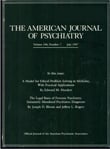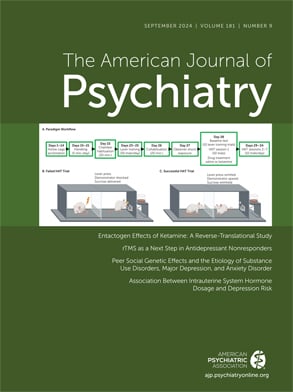Modern psychiatry is becoming a data-based scientific discipline. As in other branches of medicine, diagnoses stem from increasingly rigorously defined criteria, and treatment recommendations are based on the results of controlled clinical trials. The days of “impressionistic,” seat-of-the-pants formulations and treatments are rapidly disappearing.
Among psychiatric treatments, data for the efficacy of ECT, especially for the most severely depressed patients, are incontrovertible. Meta-analyses of ECT trials versus placebo, tricyclic or monoamine oxidase inhibitor antidepressants, or sham ECT convincingly demonstrate the efficacy of ECT (
1). Use of modern anesthetic and ECT administration techniques has all but eliminated serious side effects. In addition, Olfson et al., in this issue of the
Journal, have confirmed that ECT may lead to shorter and less costly inpatient care.
Given this demonstrated efficacy, safety, and economic savings, one would assume that the use of ECT would be more uniform throughout the United States. Hermann et al. (
2), however, have demonstrated that use of ECT varies widely and depends on geographic location, with some areas of the United States hardly administering the treatment at all! It is likely that psychiatric residents in some residency training programs may never even see an ECT treatment, let alone administer a treatment and witness its efficacy.
If our psychiatric treatments are, indeed, based on the results of research, how, then, are we to account for the wide variability in ECT treatment in the United States? Despite the data, it appears that there continues to be ambivalence among American psychiatrists toward this efficacious and safe treatment. One reason may lie in its history of unmodified administration and the resultant side effects. Certainly films such as Shock Corridor, One Flew Over the Cuckoo's Nest, and Frances cannot have helped its reputation. However, there may be another more central reason for this ambivalence. With a few notable exceptions, there is little ECT research being conducted in major American psychiatric centers compared with research on pharmacological treatments. Many of the efficacy studies are one or more decades old. Rigorously designed multisite collaborative studies, using modern research techniques, of ECT's efficacy and predictors and correlates of response, relapse, and maintenance do not exist.
It appears that ECT has failed to attract current scientific curiosity. Despite a journal devoted exclusively to convulsive therapy, and a society of dedicated researchers and clinicians, there has not been the same systematic accretion of clinical research into ECT's mechanisms and efficacy as there has been for antidepressants. Examination of articles published in the past 3 years in The American Journal of Psychiatry, for example, reveals not a single controlled study of efficacy or mechanisms of action. Without such studies, there cannot be adequate comparison among modern psychiatric treatments, nor can knowledge increase regarding pathogenesis of psychiatric illness, as well as its treatment.
What is to be done? We lack comparisons of ECT's efficacy with adequately dosed trials of new antidepressants for all categories of depression, especially for our sickest patients. We need carefully collected data on the therapeutic impact of ECT for the suicidally depressed patient, both acutely and after treatment. Direct comparisons of long-term outcome, cost, and safety of ECT with pharmacological treatment are essential. In an effort to understand its therapeutic mechanisms, new research strategies such as imaging studies conducted before, during, and after ECT in depressed patients of all ages should be performed. Using modern molecular biology techniques, we need inquiry into acute and chronic effects of ECT on basic mechanisms of synaptic and second messenger function, neuronal adaptation, long-term plasticity, and hormonal response.
There is much fascinating research to conduct, if we can only overcome a professional ambivalence toward ECT and ignite the imagination and enthusiasm of our trainees and young research colleagues. Let us not perpetuate outmoded, nonscientific, and incorrect attitudes toward ECT in our younger colleagues. Rather, let us stimulate scientific curiosity and research into this cost-effective and safe psychiatric treatment.

